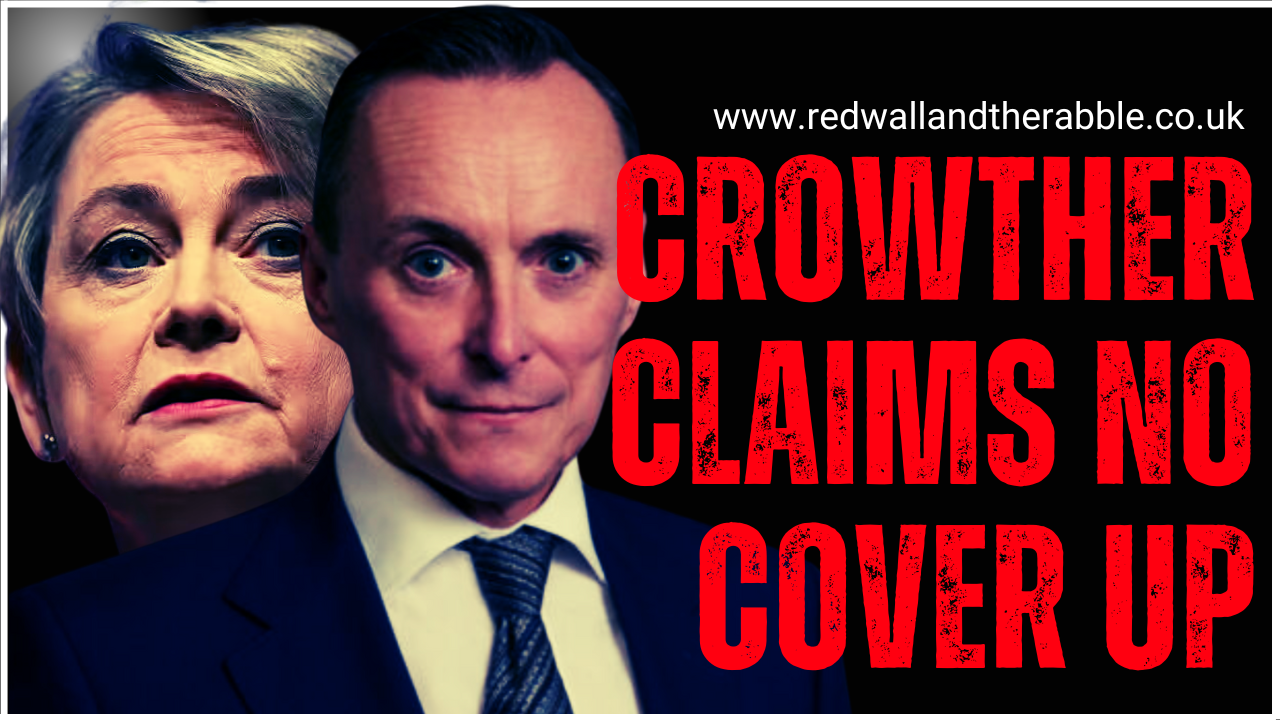Rewriting Telford: How a Judge Documented a Cover-Up, Then Denied It Happened

Tom Crowther KC's claim that he "did not come across in Telford any sense of a cover-up" is more than misleading, it's a dangerous distortion that compounds the very injustice he was appointed to address. His denial doesn't just contradict evidence; it betrays thousands of children whose suffering was systematically ignored, dismissed, and buried by those sworn to protect them.
What makes his denial all the more shocking is that his own Telford report, spanning four comprehensive volumes, provides overwhelming documentation of precisely the institutional behaviours that constitute a cover-up. The evidence he himself compiled and published contradicts his public statements, raising serious questions about his integrity and intentions.
TELFORD: A WASTELAND OF INSTITUTIONAL FAILURE
The brutal reality of Telford stands as one of Britain's most catastrophic moral failures:
- Children as young as 11 were drugged, gang-raped, and tortured while authorities looked away
- Victims were murdered for attempting to escape their abusers - including Lucy Lowe, burned alive with her family by her rapist
- Authorities labeled sexually exploited children as "prostitutes," effectively criminalising victims while shielding predators
- For four decades, from the 1980s onward, reports of industrial-scale abuse were methodically suppressed
- The scandal remained hidden until journalists, not politicians, police or the council, finally exposed that an estimated 1,000 children had been sacrificed to institutional indifference
When the Independent Inquiry into Child Sexual Abuse was established, Telford was deliberately excluded. Only relentless public pressure forced a separate investigation. The very one Crowther now claims found no evidence of a cover-up.
Meanwhile, Shaun Davies, the former Chief Executive who presided over Telford & Wrekin Council during this catastrophic failure, has been rewarded with a seat in Parliament. The message is clear: in Britain, allowing children to be raped is not a barrier to political advancement.
ANATOMY OF A COVER-UP
A cover-up isn't always men in darkened rooms signing pacts of silence. More often, it's a culture of wilful blindness, where inconvenient truths are buried beneath bureaucracy and cowardice:
- Whistleblowers silenced: Teachers, social workers, and junior police who raised alarms were marginalised and ignored
- Intelligence deliberately withheld: Vital information about perpetrators was not shared between agencies, allowing predators to operate in plain sight
- Investigations sabotaged: Cases were prematurely closed or simply never pursued
- Reports buried: Documentation of abuse was routinely downgraded, misfiled, or "lost"
- Victims intimidated: Girls brave enough to come forward were dismissed, blamed, or threatened with prosecution themselves
This is the textbook definition of institutional cover-up. It is the same pattern exposed in Rotherham, Rochdale, and Oldham. Yet Crowther claims to have seen "no sense" of it, despite his own four-volume report documenting these exact patterns of institutional suppression.
THE DEVASTATING COST OF DENIAL
The consequences of this systemic suppression are measured not just in ruined childhoods, but in lives permanently destroyed and lost:
- Young girls trafficked between towns like commodities
- Survivors left with lifelong trauma, addiction, and psychological damage
- Families devastated as daughters were groomed into believing their abusers loved them
- Communities fractured by the knowledge that authorities abandoned their children
- Perpetrators empowered by the certainty that they would never face justice
When Crowther denies the existence of a cover-up, he doesn't just rewrite history, he inflicts fresh wounds on survivors and campaigners who have spent decades fighting to have the truth acknowledged.
If Crowther truly believes there was no cover-up in Telford, despite the wealth of evidence proving otherwise, evidence he himself compiled, how can we trust him to deliver justice in Oldham and beyond? Survivors and the public deserve transparency, not another establishment figure excusing institutional failure.
CROWTHER'S DANGEROUS NEW MANDATE
Crowther's appointment by Home Secretary Yvette Cooper to lead five additional inquiries, including directly taking control in Oldham, now represents a grave threat to justice. His denial of the Telford cover-up raises urgent questions:
- Is he being positioned as the establishment's shield, tasked with minimising institutional culpability rather than exposing it?
- Will he continue to frame deliberate suppression of evidence as mere incompetence?
- Will he avoid examining the complicity of senior political figures who prioritised careers over child safety?
- Will he sidestep the uncomfortable but necessary questions about the racial and religious patterns in these crimes?
- Can a man who refuses to acknowledge a cover-up in Telford be trusted to recognise identical patterns elsewhere?
THE BETRAYAL CONTINUES
Crowther's denial represents more than semantic disagreement - it reveals a system still working to protect itself rather than deliver justice. His statement serves powerful interests who prefer that we view these catastrophic failures as unfortunate mistakes rather than deliberate acts of institutional self-preservation.
The victims of Telford, those who survived and those who did not, deserve acknowledgment of what truly happened: a systematic, decades-long cover-up that sacrificed children to protect reputations, avoid difficult conversations, and maintain political convenience.
With Crowther now overseeing multiple inquiries, the question must be asked: is he here to expose the truth, or to bury it once again?
The truth remains, regardless of Crowther's denial: What happened in Telford wasn't just failure, it was a betrayal. And that betrayal continues every time someone with power refuses to call it what it is.
Raja Miah MBE